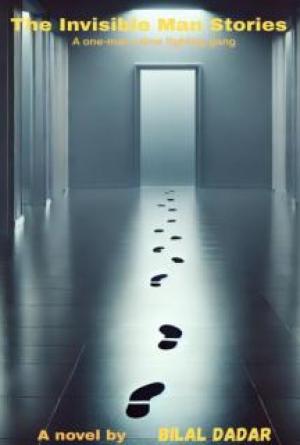“I appreciate the fact that that English is a second language," The barrel-chested woman observed, "but, perhaps on rare occasion you could consult a dictionary?”
“Computer hab spell check,” he offered. “Is same thing.”
Sage, who sat near the front, wondered if the writing instructor went out of her way to foster the image of a physical grotesque. The frumpy woman stood five foot three and weighed a hundred and sixty pounds. Like some displaced time traveler from the psychedelic sixties, she favored flowery, moo moos and wire-framed granny glasses. Under the best of circumstances, the woman with the orangey hair would never be a fashion plate. Sage wouldn’t have been the least bit surprised to discover that Ms. Monahan never shaved her armpits or bothered with feminine deodorants.
At the previous meeting of the writers' group, Abi told a funny story.
Over the winter he traveled back to his homeland to visit relatives. As the Beechcraft King Air twin-prop landed in Baku, the plane badly overshot the runway by several hundred feet, caroming off the asphalt into an open field of barley. The Caspian Sea was visible out the grimy passenger window a short distance to the east. "Was not so good the brakes," the Armenian immigrant noted with a goofy smile that belied his somber tone recounting the ordeal.
As Abi explained it, the region was desperately poverty stricken, the government feudal and corrupt. When a domestic plane experienced mechanical problems or needed routine maintenance, spare parts were often purchased on the black market. They were third rate, the substandard metal either too soft or brittle. It's just the way things were. The provincial country was one of six independent Turkish states with Russia to the north and Iran due south.
Abi desperately wanted to get it all down on paper, to chronicle his bizarre experiences. "I go home for Christmas to visit family, not for to swim in Caspian Sea." He chuckled and rubbed good-naturedly at his hairy chin. Abi was just Abi - a grease monkey, heartbroken over the immutable loss of his spiritual homeland. So he joked in fractured English and, as best he could, jotted down his life story. Nock. Nock.Nock.
Eight students signed up for the creative writing workshop. Two dropped out before the first class. Among the participants, there was Carl, a sixteen year-old high school junior with a twitchy eye. Phyllis, the menopausal housewife, admittedly hadn’t written anything more challenging than a grocery list in years. A chubby girl, Sage Ostrowski, waitressed at Ryan’s Diner. Abi, the Armenian who emigrated from Azerbaijan in central Asia, worked as a mechanic at the tire shop.
The first session, Ms Monahan inquired about the mechanic's name.
“Is short for Abimelki,” he explained. Abi meant father and melik king. The Assyrian variant was Abimelki, a name which was common in biblical times but not so anymore. The Armenian mechanic's short stories contained a veritable junk heap of dangling participles, split infinitives, ill-chosen adjectives and other syntactical abominations. But everyone in the writing group was grammatically challenged. Phyllis, the grocery list lady, favored absurdly prolonged sentences that gobbled up entire paragraphs before a period ever materialized to bring the verbal chaos to a thudding halt. Wearing his anal-compulsive angst like a badge of honor, Carl, the child prodigy, suffered autobiographical diarrhea, and Sage wrote exclusively in short, choppy sentences. Thunk! Thunk! Thunk! Thunk! Abi, whose name meant 'father-king' in a defunct, thoroughly moribund language, was still grappling with the proper spelling of one-syllable words.
“I liked Abi’s story just fine,” Sage blurted.
Beatrice lowered her head and stared at the girl over the top of her bifocals. “How so?”
“Faulty grammar taken aside, he did well describing the tension between local the Christian villagers and their Moslems neighbors.”
"Unfortunately, editors wading through a slush pile of unsolicited manuscripts at the Yale Review are looking for something a bit more polished." The instructor’s rebuttal was accompanied by a glacial smile. Retreating to the safe haven of the oak desk at the front of the room, the teacher set the class to work on an impromptu, flash fiction assignment.
Abi, who was unfamiliar with the Yale Review, grinned proudly and continued to stroke his lush beard. Nothing fazed the middle-aged man. His people had been massacred by the Turks, routed from their ancestral homeland and dispersed to an unsympathetic Diaspora. What more could a mean-spirited Beatrice Monahan do to deepen the hurt?
“Screw the Yale Review!” As if on cue, everyone in the class ceased writing and shifted their attention to the rear of the class, where Carl was seated with his head down and legs splayed out at a perverse angle beneath the desk. “Dickens wrote in run-on sentences. Nobody gave him grief for the endless wordiness.”
“Excuse me?” Beatrice compressed her lips together in a tight, bloodless line and eyed the youth with mild annoyance. “What was that?”
“Jane Austen was addicted to double negatives. William Faulkner frequently started sentences with conjunctions.” Carl waved a slender wrist fitfully in the air, carving the space into manageable chunks. When he spoke again, there was a shrill, neurasthenic intensity to his tone that was offsetting, almost unnerving. The boy’s eyes flitted about the room as though searching for moral support.
“Your point?” The instructor could sense her iron-fisted control over the class ebbing away.
“Maybe Abi’s grammatical gaffes aren’t so terrible.”
“It’s true that not all grammar violations are created equally.” Beatrice Monahan was clearly on the defensive, “but then, some blunders indicate a blatant disregard for what’s commonly accepted. These are the result of laziness, cluelessness, or lousy editing, and they’re not okay.”
Carl shook his head violently and began karate chopping the air with renewed vigor. “Cummings refused to capitalize,… H. L. Mencken wrote incomplete sentences. Arthur Conan Doyle favored the passive tense.”
Beatrice waited a good ten seconds before addressing the agitated student. “Are you done?”
Whatever elicited the verbal eruption had run its treacherous course. Carl retreated into his insular, ever-so-private universe. “Just trying to make a point,” he added meekly.
* * * * *
An hour later toward the end of the class, Beatrice asked, “As writers, who would you want to emulate?”
The minute hand on the clock over the chalkboard was edging up on nine p.m.. Everyone was tired, their creative juices played out. Carl announced that Raymond Carver was the best contemporary American writer.
“He’s dead,” Beatrice interjected, “which makes him less than contemporary.”
“Yes,…” Carl blushed and his eyelid twittered an impromptu ballet, “but he’s still quite popular.”
Phyllis was a diehard Alice Monroe addict, having slogged through most everything the Canadian writer had written. Sage was partial to Hemingway and J.D. Salinger.
Beatrice smiled frigidly. “And who do you read, Mr. Petrosyan?” The reptilian expression deepened, grew more intractable. “Of all the great literary figures, who’s your favorite?”
“Greatest writer is Saroyan… William Saroyan!”
“Saroyan,” Beatrice repeated. Abi’s response caught her off guard but only momentarily. “Some people have accused him of excessive sentimentality.”
Sage cringed. Why couldn’t she just let Abi alone? Give him his space?
“What have you read by Saroyan?” she pressed.
“I dunno.” Abi’s eyes fogged over. After an uncomfortable pause he mumbled, “The Human Comedy.”
“Anything else?”
“My Name is Aram.”
Beatrice Monahan drummed her pudgy fingers on the Formica desktop. Her mannish jaw screwed to one side, deep in thought. “And what did you learn from Saroyan?”
“I dunno,” he returned dully. “Was Armenian like me.”
“Yes, but that doesn’t answer my question. You mentioned a specific author so you must remember some plot, narrative… denouement.” Drawing the last word out with a decidedly French accent, she was clearly baiting the mechanic with the Goodyear Tire logo emblazoned on his chest.
“Last chance to redeem yourself,” Beatrice chirped,” and offer your classmates some personal insight into the writer’s weltanschauung.”
Abi cracked his knuckles noisily then rubbed his somber face with calloused, grease stained hands. “Saroyan… is greatest writer whole universe!”
* * * * *
“Want to grab a coffee?” Sage was waiting outside the community college center when Abi emerged.
“Would be nice,” Abi watched as the other students filtered out into the parking lot. A Honey Dew just up the street stayed open until eleven. At the donut shop they ordered hot drinks. "Something to eat with that?" the waitress asked.
Sage shook her head self-consciously. "I'm watching my weight."
When they were seated, Abi sipped at his coffee and glanced out the front window. The last of the dusky, late summer light had bled out of the sky wrapping the town in wooly darkness. From his wallet he withdrew a tattered picture postcard folded in quarters. “Is mine country. Murovdag… is the highest mountain range in the Lesser Caucasus.”
He handed her the picture, which showed a rugged, hilly country with grassy valleys and snowcapped mountains in the far distance. A stone structure constructed in a combination of Byzantine or Roman styles – she couldn’t be sure – stood in the foreground. A dozen arched columns rose thirty feet in the air creating an outdoor portico. “Is beautiful…no?”
“Yes, quite lovely.”
She returned the card, which he refolded with infinite care like a family heirloom.
“Key, kitten, kite, kilo, kiss, kick, kangaroo is begin with k,”, Abi sputtered bitterly, remembering Beatrice Monahan’s snide indignities. Is no ‘k’ sound with knock.”
Sage suddenly felt a surge of homicidal rage toward the florid, red-haired teacher with her effete predilections. “The ‘k’ is also silent,” Sage explained almost apologetically, “in the verb ‘to kill’.”
“Silent letter,” Abi repeated wearily. “Is stupid… makes no sense.”
“For what it’s worth, Beatrice hasn’t had a nice thing to say about anyone’s writing.”
The previous week the instructor trashed one of her stories, insisting the main characters were unsympathetically drawn - little more than one-dimensional stick figures and talking heads. The expository prose was tedious, dialogue stiff. “I thought your story rather touching,” Sage noted. “What Beatrice said earlier was a cheap shot.”
“I spell,” Abi observed glumly, “like second grader.”
“Getting published in the Yale Review isn't the point,” Sage shook her head emphatically. “Never was.” “Maybe you’re lonely... homesick, so you write about a mountain village ten thousand mile away in the Lesser Caucasus and, in pouring your heart out, comes to terms with the loss.”
A mother with two freckle-faced children entered the doughnut shop. They bought an assortment of donuts and disappeared back out into the street. “How’s your thyroid condition?”
The odd question caught Abi totally off guard. In response to his baffled expression, Sage added, “When I got to class, you were shaking one of those distinctive, butterfly-shaped pills from a plastic prescription container into your palm.” She blew on the coffee before raising the Styrofoam cup to her lips. “I took Synthroid for six month. Gave me the goddamn heebie-jeebies... almost had a nervous breakdown.”
“You don’t take medicine now?”
“Not that crap!” Sage shook her head violently then leaned closer over the table and continued in a confidential tone. "We belong to an exclusive club… more like a carnival freak show," the fleshy girl added almost as an afterthought.
"What is?"
"People with thyroid conditions… we're always looking for something better, comparing notes."
"You have funny way of putting things."
A black man with dreadlocks and a guitar case slung over his shoulder entered the donut shop. He ordered a coffee with a glazed donut and headed back out into the evening stillness. "Brain fog… ever get it?"
Abi nibbled at his jelly donut. "Some days is worse," he confided.
Brain fog. You couldn't think straight or remember the simplest detail. It was like being diagnosed with presenile dementia forty years too soon. How did you explain such nuttiness to 'normal' people? Brain fog - what a stupid expression!
"Some days," he noted, "I can hardly think straight, I'm so screwed up." He cleared his throat. “Cold… always cold. Even in summer, sleep with two, wool covers.”
"What about the heebie-jeebies?" Abi’s face went blank. Sage raised a hand, palm down over the table and the fingers fluttered listlessly. "The jitters, shakes, the creeps…”
“Yeah.” The middle-aged man smiled sheepishly. “I go work Goodyear Tire, but brain go somewhere else.”
Sage nodded sympathetically. “Some days are definitely worse than others."
The endocrinologist initially started Sage on a regimen of seventy-five micrograms levothyroxine. The first week she was bushwhacked by panic attacks in the lobby of the Brandenberg Public Library; a few days later while climbing a short flight of stairs, she felt an erratic flurry of palpitations mimicking angina, then broke out in a cold sweat.
Dr. Balcewicz response was to increase dosage.
"Why are you giving me more medicine, if I don’t feel good?"
Dr. Balcewicz, a pear-shaped man with a florid complexion and bristly, salt-and-pepper moustache, grinned affably. "Your TSH levels are still much too high. The temporary unpleasantness will subside over time. Trust me."
What good was trust when a patient found herself in worse shape than before she sought medical intervention? At their next meeting Sage complained, "If you don't take me off this dog shit, I’m gonna go nuts."
“You aren’t giving the pills enough time to work properly.”
“What about desiccated animal hormone?” Sage learned about the old-school therapy on the internet.
"Wrong percentage of T3 versus T4," the older man in the clinical white jacket replied authoritatively. "What works for pigs and bovines is ineffective for humans… chemistry is all wrong."
"But I read where tons of people swear by the stuff."
"Mostly crackpots and older people," the doctor said, "who took the stuff a century ago, before there was any sensible alternative." Leaning forward, he patted her lightly on the shoulder. "Look, you're a reasonable kid. You want the best that modern medicine has to offer, not some outmoded, nineteenth century snake oil." Actually, Sage did want outmoded, nineteenth century quackery. Outdated, outmoded, poppycock, twaddle, quackery - what the hell did Sage care as long as it made her feel half-human again?
Dr. Balcewicz stared at the morose young woman seated on the opposite side of the desk. His pokerfaced expression never wavered. The impasse was broken only when the doctor reluctantly reached for his prescription pad and began scratching out a new order. "Levoxyl is a safe alternative to the generics." He pushed the script across the desk. "Let's see how you make out on this new medication." Before Sage could collect her addled thoughts, the endocrinologist was already racing out the door toward an adjacent examining room.
Levoxyl stabilized Sages illness but created a whole new set of disturbing side effects that Dr. Balcewicz blithely dismissed of with nonchalant humor.
Abi finished his donut and dabbed his mouth with a napkin. "What you take now?"
"A desiccated supplement made from pig thyroids.
“Doctor gipt you?”
She shook her head. “Most traditional MD's won't prescribe organics. They claim it’s voodoo medicine, so I gave doctor Balcewicz the bum’s rush and switched to a naturopath." Reaching into her purse Sage located a pen, scribbled some numbers on a clean napkin and handed it to him. "There's my telephone. Like I said, it’s an exclusive club and us thyroid freaks got to stick together.”
* * * * *
Prickly ash bark, sarsaparilla, oat seed, shizandra berry, ashwaganda and maca root.... Before leaving the community college parking lot, Sage fished about in the glove compartment of her Toyota. “Here try this.” She handed Abi a smallish, opaque bottle.
“What is?”
“An adrenal support herbal formula. I got a spare bottle at home. Just follow the directions.”
From a backpack Abi withdrew an inch-thick paperback with a lemony yellow cover. “Is goot, no?”
Sage glanced at the title. English Grammar for Dummies. “Yes, I’m sure it will help.”
“There, their, they’re… is difficult language, but I learn.”
“It’s hard enough,” Sage confirmed, “for people who were born in America.”
Abi retrieved the book and buried it back in the canvass bag. “Yesterday I went to library…read Chekhov, second best writer whole world.”
“What did you learn from the Russian?”
“Only write ordinary life.”
“What else?”
“Don’t waste words.”
Later that night, Abi dribbled ten drops of the rust-colored herbal solution into a tumbler of water and tossed down the bitter solution. Sage was seeing a naturopath. Maybe he would make an appointment with the holistic practitioner to discuss a non-pharmaceutical alternative. An hour after taking the herbal remedy, the Armenian already felt better, although he realized, full well, that the euphoric sense of well being was probably more wishful thinking. Still later that night as he lay under the covers, Abi felt warm. He removed a blanket - just one as a precautionary gesture. The heebie-jeebies weren't completely gone, but manageable. And his spirits lifted ever-so-slightly.
Maybe when the hormonal brain fog finality dissipated and an implacable universe of silent ‘k’s had been laid to rest, Abi Petrosyan, whose plane almost ended up at the bottom of the Caspian Sea and name meant father-king in an ancient tongue, would write the next contemporary American masterpiece.
back to Table of Contents
I & Thou
The Orthodox Jew moved into the freshman dormitory early Sunday morning. Celeste and Jennifer watched the odd looking creature accompanied by an equally exotic, extended family lugged his belongings up to the second floor landing, three doors down from Jenifer’s room. All the women were homely as sin with chalky skin that wouldn’t tan in a hundred cloudless summer days stretched end to end. Even in the oppressive, Indian summer heat, they wore drab skirts that hung down well below their knees, their hair tied up in kerchiefs. The menfolk wore black hats or yarmulkes, white shirts buttoned at the wrist and dark pants.
The boy - his name was Joel Shapiro - had a scraggily black beard and piles of kinky hair obliterating his ears. As if that wasn’t weird enough, he sported a pair of old-fashioned, wire-framed glasses with absurdly thick, coke-bottle lenses. Like some incongruous caricature from the previous millennium, he lugged a Mackintosh computer into the room depositing it on a study desk before lumbering disjointedly back down stairs for more personal effects.
“The Yarmulke’s the only freshman with a room to himself,” Celeste grumbled. She had dubbed him ‘the Yarmulke’ almost from the minute Joel arrived at school. Celeste and Jenifer roomed together. She drank too much and was a bit of a slut but tons of fun. When Celeste’s gynecologist put her on birth control in eleventh grade, the girl went hog wild. No need for moderation or self-control; the tiny, multi-colored pills trumped all moral taboos. Problem was, her acidic humor could get out of hand, downright vitriolic at times, and she never knew when to back off.
A lot of girls gained weight when they went away to college. The ‘freshman fifteen’ – that’s what they called it. Jenifer had seen pictures of Celeste from her high school years when she was svelte and a real looker. But her roommate bulked up since then and, being petite, the surplus flesh had taken up permanent residency on her hips, thighs and mannish shoulders. Celeste was still passably pretty but for how long with all the booze she consumed on weekends?
“He’s probably got religious or dietary restrictions,” Jennifer offered.
“What I wouldn’t give for a private room!” Celeste groaned. The Jewish boy was wearing a black, felt hat now which looked rather silly given the high humidity and endless parade of undergrads wearing T-shirts with the college logo or chic, designer outfits.
* * * * *
Friday evening the third week in October, Celeste staggered back to the dorm polluted out of her gourd. “Yarmulke at ten o’clock,” she sniggered, garbling her words. It was another of her acerbic jokes. If Celeste whispered, “Yarmulke at ten o’clock,” Jenifer gazed left to see the hairy Jewish boy loping towards them with his disjointed gait. Everybody laughed hilariously but it was mean-spirited, and Jenifer always felt guilty afterwards – both for joining in the nasty buffoonery and making Joel the butt of their infantile humor.
In the hallway three doors down, the Jewish boy was easing a key into the lock. He held a navy blue, felt pouch with a Star of David embroidered on the front in gold thread. A thick black book was tucked under his arm. Cracking the door, he disappeared into the room. “These religious Jews… what’s their take on the birds and the bees?”
“Leave him alone, Celeste,” Jennifer hissed.
“Do you think he wears that foolish felt hat to bed when he makes love?” Celeste snickered idiotically. She was really blotto – sloppy, fall-down drunk. Lurching down the corridor at a lopsided gait, she made her way to Joel’s room and pounded on the door. When it opened, she brushed passed him into the room, the door slamming shut with a resounding thud.
Half an hour passed. Jennifer stepped into the hallway. All was quiet, not a sound filtering back from any of the adjoining dorm rooms. Then the third door down creaked opened slowly and Joel inched out in the corridor. He was still dressed formally with a dark jacket and his signature yarmulke. Long strands of curly hair hung down in back of his ears like tendrils. Jennifer remembered seeing such locks in artwork depicting the Medieval Hasidic Jews.
As he passed in the hallway Joel looked up and smiled – the gentlest expression of human affection. “Good evening,” he said softly. “Your friend isn’t feeling well… a problem with her stomach.” He spoke in a plodding, unhurried manner then stared pensively at the book he was clutching for the longest time. “You’re Christian?” Jennifer wagged her head.
“Which denomination?”
“Catholic.”
Joel lowered his gaze a second time and rubbed the frayed spine of the book in a rhythmic, undulating motion with a thumb. “Idol worshippers and petty hoodlums.”
Jennifer felt her brain go numb.
The off-hand comment caught her like a sucker punch to the rib cage. When he finally raised his eyes again the expression was opaque, inscrutable. “When I was in second grade, one of my classmates told me that Easter was coming.” “Easter… the word meant nothing to me. I was eight years old, an orthodox Jew.” “My classmate told me in somewhat fuzzy details about the crucifixion,” Joel chuckled mirthlessly. “Jesus Christ… I didn’t know your Savior from a hole in the wall, so I just shook my stupid head up and down like a big dope, went home and asked my seventy year-old grandmother for clarification.”
Joel removed his broad, felt hat and ran an index finger along the circumference of the sweatband. “I said, ‘Grandma, who was Jesus Christ, the Catholic messiah?’” “I asked this of a decrepit, old woman who spoke broken English with a Slavic accent … a woman, who had seen three-quarters of her family slaughtered by the Nazis, carted off to the gas chambers at Bergen Belsen, Dachau and Treblinka.” Joel blew out his cheeks and wagged his head, a gesture of futility.
“Your grandmother… what did she say?” Jennifer pressed.
“She claimed that she knew Him from the old country. They were neighbors.”
“Jesus Christ?”
Joel cracked a wry, close-lipped grin. “Jesus, Mary, Joseph… the whole unsavory clan. Good-for-nothing troublemakers, that’s what they were.” “She remembered Him from when he was a little boy, throwing stones and breaking windows. An incorrigible, farshinkener, juvenile delinquent!”
“And why exactly are you telling me all this,” Jennifer insisted.
Joel cleared his throat and shrugged. “The So







